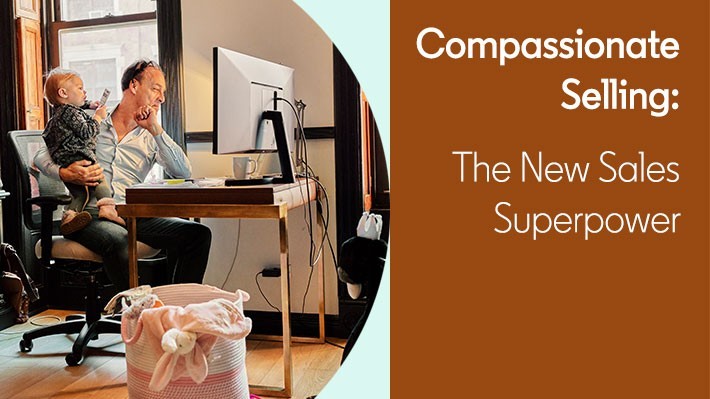B2B sales strategies and trends
For sales leaders, compassion is emerging as a superpower
Prior to the COVID-19 pandemic, 55% of salespeople told LinkedIn that they relied on in-person meetings to build relationships. That insight shows just how disorientating the changes of the last few months could be for most people in our profession. And yet, across many different types of businesses, we’re seeing sellers rising like champions to overcome the challenges thrown at them.
As Head of the European SMB & Mid-Market Acquisition business for LinkedIn Sales Solutions, I’ve been lucky enough to see this first-hand. I’ve been watching a generation of sales managers and sales leaders grasping the value of compassion in guiding a team through this transition. It’s coming to define the way their organisations operate.
It’s worth taking a moment to reflect on what compassion means in the context of sales leadership. Compassion isn’t just kindness. It’s demonstrating a deep understanding of another’s circumstance, and the willingness to do something about it. Compassion is an invaluable element in your sales strategy that’s crucial for helping your team evolve at the speed they’ll need to. It’s a vital leadership skill in unpredictable times.
Last month, I was part of a Live Sales Leaders Panel on Leading with Compassion hosted by LinkedIn Sales Solutions’ VP Sales for EMEA and Latin America, Liam Halpin. We were joined by CapGemini’s Executive VP and Head of North America Jean-Claude Viollier and Janine Chamberlin, Director of Talent Solutions for LinkedIn. Together we were able to share experiences over the last few months that show just how adaptable the sales profession is proving to be.
The roles of virtual and face-to-face have changed for good
Businesses that once saw themselves as dependent on trade shows and conferences have been surprised at the level of productivity remote selling can achieve. You can’t put awareness like this back into the bottle. It’s a game-changer. It doesn’t mean that face-to-face meetings or offices for sales teams are now consigned to history – but it does mean that we’ll use them differently and more selectively. The question we’ll ask is whether face-to-face really adds something that can’t be replicated remotely.
“I think we’ll look at face-to-face selling in a similar way to how we look at offices,” says Janine Chamberlin. “We’ll go back – but we’ll use the space differently. We’ll go in to have specific conversations and work together collaboratively on certain things.”
Establishing authenticity is crucial for a resilient team culture
As sales professionals, we’ve discovered surprising benefits to working remotely – but we’ve also discovered that there are significant downsides as well.
In my case, it’s eliminated a 40-minute commute in two directions and given me more time with my family. At the same time though, I’ve felt a sense of Groundhog Day seeping into my life. Some days it’s hard to get out of bed to face another working day without any in-person professional interactions.
If we’re to build resilient team cultures during this time, we have to ground them in authenticity about the good experiences – and the bad. As a sales leader, you can set the example. If you’re having a bad day, tell your team. Be honest. You’ll find, counter-intuitively, that morale goes up as a result.
Effective sales leadership now starts with empathy
Empathy gets discussed a lot in sales – but all too often, in the context of a skill that you switch on when dealing with clients. That’s changed. In this uncertain working situation, effective sales leadership can’t exist without empathy.
As a manager, if you have a sales team member who’s one of two working parents, sharing a small space with a young child, there’s little point banging your fist on the table and saying, “you owe me the time,” or “I need you on that call.” If you unthinkingly expect an unchanged contribution from people who are no longer in control of their working circumstances, then you’re missing the point of managing people. That’s not what leadership is about.
Leadership in unpredictable times rests on compassionate understanding – recognising when a situation is impossible, identifying what needs to give and how it can be accommodated. That will involve tailoring expectations of people, arranging for others to help take on the load, or taking on some of the load yourself. It’s been a privilege to witness so many younger sales leaders rising to this and learning the power of compassion in leading their teams.
Coaching can’t be lost in the shift to working from home
There are many selling skills that will increase in importance as we switch to building relationships virtually. That’s why it’s vital that we find a way to make coaching work at distance.
I’ve been working with my sales managers on exploring ways that we can improve our remote coaching skills, and ensure that our reps don’t suffer by being physically apart from their managers. In LinkedIn’s latest State of Sales report for Europe, there’s a clear appetite for coaching on the part of salespeople that often exceeds what managers are able to make time for. Closing this gap should be a priority.
We need the confidence to focus on the opportunity
We lose some key advantages when we can’t share a room with a customer – but we gain many advantages at the same time. I find it humbling to be invited into the home of every one of the clients with whom I speak via Zoom – and to have the opportunity to invite them into my home as well. It’s a new level of intimacy that’s invigorating – and helps to establish a bond faster than can happen when meeting in a neutral office space.
Focusing on the opportunity is essential as we look to guide sales teams through the next few months. Businesses of all types have an urgent sense that decisions need to be taken. That creates many different types of opportunity. As sales leaders, it’s our job to give our teams the energy and confidence to act on those opportunities.
And compassion is the key to making it happen.
Topics: Sales webinars Sales management B2B sales strategies and trends
Related articles



